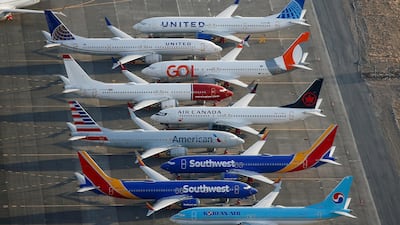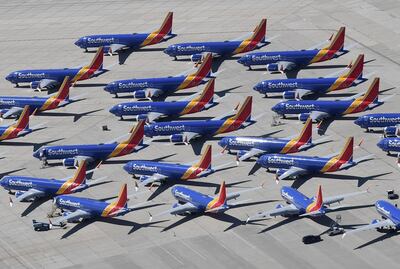Boeing is in "advanced" talks with airlines for new 737 Max purchases following the vote of confidence by British Airways owner IAG that intends to buy 200 of the single-aisle jets, the company sales chief said.
The plane manufacturer's agreement with IAG, led by chief executive and former 737 pilot Willie Walsh, has "absolutely" given other airlines confidence and signalled that they should take the plane seriously, Ihssane Mounir, Boeing's senior vice president of commercial sales and marketing said on Monday.
Boeing is now looking to regain market share after two fatal crashes involving the 737 plunged the company into its biggest crisis and put the future of the jet, an industry workhorse, into question.
"I can't get into commercial discussions but I can tell you we have a number of discussions with airlines right now," Mr Mounir said. The discussions "are pretty advanced for procurement of this aircraft," he said. The IAG deal "definitely got people's attention, no question about it", he said.
Talks for potential sales of the 737 come at a crucial time for Boeing, who is working on a software update of the grounded jet's flight control system with the aim of returning it to service in the fourth quarter. In June, Mr Mounir and other Boeing executives scored a major coup when they reeled in the initial deal with IAG – an all-Airbus narrow-body customer – while the Max remains grounded globally following the crashes in Indonesia and Ethiopia.
"Every single airline that we've spoken to feels comfortable with what we've done by way of software and technical changes to the airplane from a safety perspective," Mr Mounir said. The next order of business is the "difficult" task of restoring public confidence in the embattled aircraft.
"Where we have to do a lot of work is regain public confidence and make sure they're comfortable with that," he said. "Anybody that we sat down with and had to fly the airplane and see the pre-change and post-change has got comfortable that we did what needs to be done for this aircraft."
American airlines have their work cut out for them as they try to convince hesitant passengers to fly on the 737 once the worldwide ban is lifted. At least 20 per cent of US travellers said they would definitely avoid the plane in the first six months after flights resume, according to an April survey led by consultant Henry Harteveldt. More than 40 per cent said they would take pricier or less convenient flights to avoid the Max.
The two crashes of the jet within five months killed 346 people and led to a global grounding of the Max since March. In both crashes, a flight control feature known as the Maneuvering Characteristics Augmentation System (MCAS) was implicated for pushing the jet's nose down until pilots lost control.
The Chicago plane maker is addressing hundreds of queries from aviation regulators and airlines worldwide as it prepares an updated software to improve the MCAS.
"We’ve got a robust software re-design that we’ve done for the MCAS," Mr Mounir said. "The software is ready. We’re testing it and working with regulators to make sure that its implemented properly."
Captain Jennifer Henderson, Boeing's 737 chief pilot, outlined the plane's return to service plan and highlighted the software changes.
The updated MCAS will use input from two angle-of-attack sensors rather than only one currently. If the readings differ by more than five degrees, the MCAS will not be activated. The MCAS will activate only once, if there is a high reading from the sensors with pilots being able to retain full control by cutting power to the electric trim and using the manual trim wheel.
Boeing is proposing a mandatory pilot training. It will provide all Max operators with computer-based training modules, enhanced technical description of MCAS, and supplemental reference documents and additional optional training materials, Captain Henderson said at a presentation in Renton, Washington. All 737 pilots will need to complete new training before returning to flight.
"The software updates will ensure that the sequence of events of Lion Air and Ethiopian Airlines will never happen again," Capt Henderson said.
Boeing is taking into account feedback from independent reviews of its processes by entities such as the US National Transportation Safety Board and is incorporating some of their recommendations, she said.
Boeing is going around the world to give t demos to operators, with China and Singapore scheduled in the next few weeks after completing presentations in Istanbul, Miami and Gatwick, she said.
"It was a very tragic set of events, between what happened with Lion Air and what happened with Ethiopian Airlines," Mr Mounir said. "We’re terribly sorry ... it shouldn’t have happened and we’re working day and night to make sure it never happens again."
Boeing dropped the production rate of the Max to 42 planes a month after the grounding, from 52 a month before the crashes. Once back in service, production will ramp up to 47 a month and, gradually return to 52 monthly in 2020, Mark Jenks, vice president and general manager of the 737 programme, said at the Renton site, where 737 is manufactured.
Mr Mounir said that Boeing's proposition for the new mid-market plane, known as NMA, is still valid and under study but the focus remains on the 737 Max.
"The NMA concept is the concept of twin-aisle comfort with single-aisle economics and that proposition remains valid... we continue to do our homework... when the right time comes, we’ll look at a decision," he said. "Right now, we’re more focused on returning the Max safely, that’s our No1 priority."



